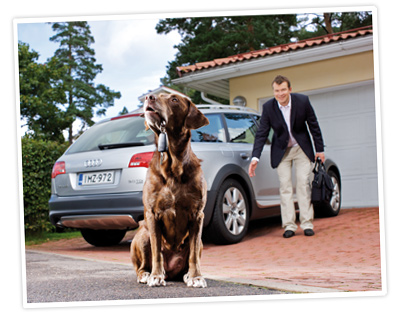Market
In 2008, 139,647 new passenger cars and
15,522 vans were registered in Finland.
The passenger car market increased by
11.2% over the previous year thanks to
the car tax reform which became effective
in early 2008. Registrations of new
vans decreased by 8.1% over the previous
year.
The market position of passenger cars
imported by VV-Auto strengthened in
2008. Volkswagen increased its market
share and held the second place in the
registration statistics of passenger cars.
The new car tax system, which is based
on carbon dioxide emissions, boosted
sales of diesel passenger cars. Diesel passenger
cars accounted for nearly 50% of
all new registrations in Finland. Volkswagen
is one of the leading brands in diesel
passenger cars. Audi also increased its
market share and maintained its position
as the most wanted premium brand. The
introduction of new Seat models and
improved price competitiveness increased
the brand's market share.
The Volkswagen range continued to
expand in 2008. Launches included the
new Passat CC and Scirocco, and the new
Golf towards the end of the year. The
Caddy range expanded with new Maxi
models. The Audi A3, A4 and A6 ranges
were renewed during the year and complemented
with the new Audi Q5. The
new arrival to the Seat range was Seat
Ibiza. In 2008, the market share of
Volkswagen passenger cars in Finland
was 11.8% and that of Volkswagen vans
15.9%. Audi had a market share of 4.2%
and Seat’s share was 1.3%. Seat's market
share was 1.5% in Estonia and 0.6% in
Latvia.

Year 2008
VV-Auto's net sales totalled €884 million
in 2008, up by 9.9% over the previous
year. The operating profit excluding nonrecurring
items was €36.3 million, compared
with €26.1 million in 2007.
In terms of vehicle numbers, VV-Auto's
own outlets in the Greater Helsinki area
and Turku accounted for about one third
of all new Volkswagen and Audi retail
sales.
VV-Auto's retail sales network consists
of 40 dealer shops selling Volkswagens
and 64 service work shops. The figures for
Audis are 17 and 41. Seats are sold by 26
dealers and maintained and repaired by
44 work shops, three of which are located
in the Baltic countries.
In 2008, the customer relationship
management system was further
enhanced on a centralised basis and
the system will be gradually adopted
throughout the dealer network. The completion
of the Vuosaari harbour caused
some changes in car logistics. The joint
logistics centre of VV-Auto and SE Mäkinen
Logistics Ltd in Vantaa offers importrelated
transport, pre-delivery and storage
services for the cars imported by VVAuto.
In September 2008, an Audi exclusive
sales outlet serving business and private
customers was opened in connection
with the Flamingo recreational centre in
Vantaa.
Objectives
VV-Auto aims to increase the market
share of the brands it represents during
2009 and to continue to enhance its
network of retail outlets. The focus will
be on expanding the range of services
and the use of the centralised customer
relationship management system and on
improving electronic customer communications.
Special attention will be paid to
improving work productivity in the company.
The car tax reform based on environmental
aspects will continue in 2009.
According to the amendment presented
by the Government on 6 November 2008,
the car tax of vans will in the future be
based on the consumer price instead of
the cif price as currently. At the same
time, the tax rate will be staggered on
the basis of carbon dioxide emissions,
according to the vehicle's fuel consumption.
After the change, taxation of vans
will be in line with that of passenger
cars. The change will also involve abolishing
the current tax that is equivalent
to the VAT and paid in addition to the tax
of passenger cars and vans, and raising
the car tax rate to offset the resulting loss
of revenue. The car tax will also become
a pass-through item, which will not be
presented in the final net sales. The
changes will enter into force on 1 April
2009.

